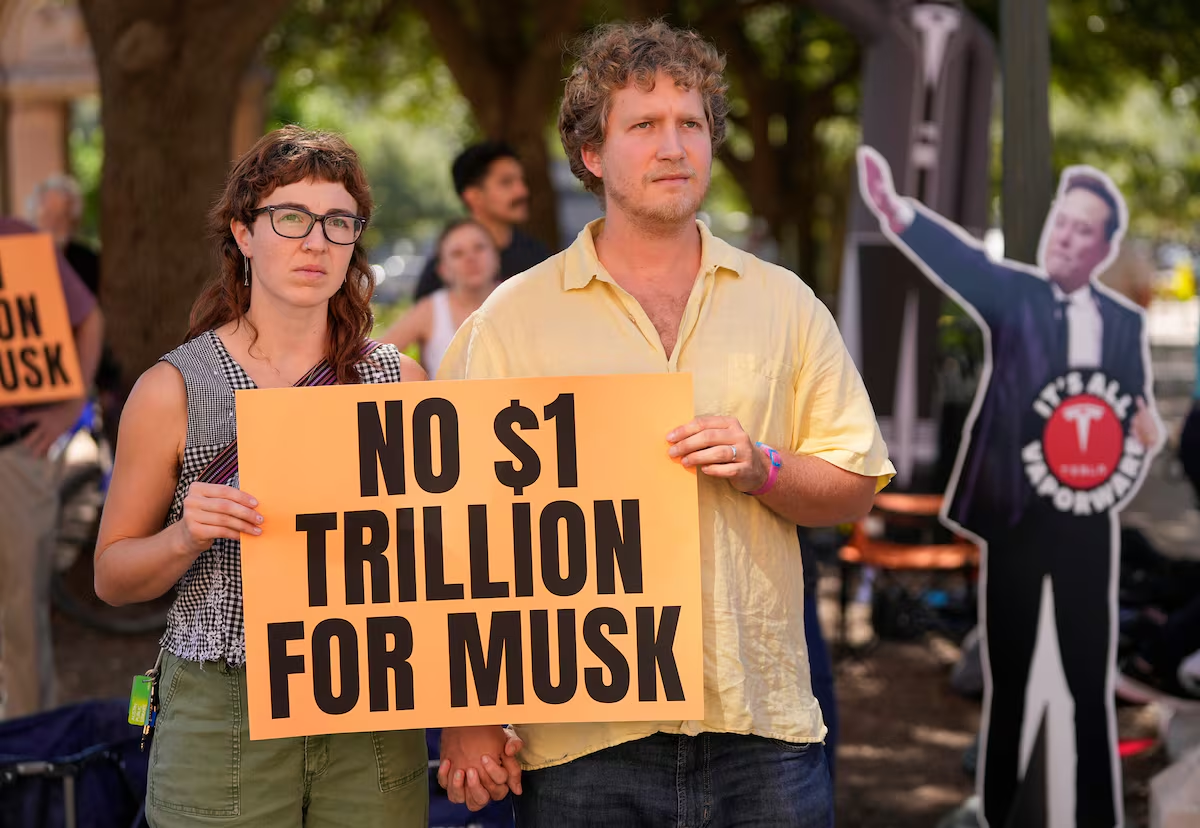
Three out of four Tesla shareholders have approved the proposal to pay Elon Musk a salary of almost a trillion dollars in stock, the equivalent of 760 billion euros at current exchange rates, to lead the company into the next decade. The decision, supported by 75% of shareholders, opens a new panorama in the traditional corporate governance rules of the world’s most powerful companies.
Musk spoke at the end of the meeting to thank shareholders for their support. “Other shareholder meetings are boring, but ours are extraordinary,” a elated Musk said after breaking every known compensation rule so far.
The compensation, about $878 billion in shares, the largest in history for the richest man on the planet, is conditional on a series of goals. Musk will have to multiply the company’s stock market value by six to reach 8.5 billion in capitalization within 12 years, sell 20 million vehicles in that period or put a million of his Optimus robots and another million of his autonomous cars on the market.
The South African is already Tesla’s largest shareholder with a 15.32% stake worth around $509 million, according to Bloomberg. If he manages to reach the goals imposed by the board of directors, he would exceed 25% of the capital of the technology group and unleash his influence in the company at the height of the race for artificial intelligence (AI). The company wants to make a shift from being a pioneer in the production of electric cars to a leading technology company with a commitment to robots, drones and autonomous cars thanks to the push of artificial intelligence.
“We are at a pivotal moment in Tesla’s history, and the proposals that the special committee has meticulously crafted and that the board of directors has presented will help determine Tesla’s future,” the company notes in defending its proposals.
Investors voted on a dozen proposals, including the re-election of three key executives, an equity incentive plan or the investment strategy for xAI, the group’s start-up. But the issue that attracted the most attention was the very generous compensation plan of Musk, who is already the richest person in the world with an estimated net worth of $473 billion, according to Bloomberg’s classification.
“Elon is a generational leader, and under his visionary leadership, we have the potential to become the most valuable company in history and, in turn, create unprecedented value for our shareholders,” the company notes, in an undoubtedly flattering tone, in its previous communications to convince shareholders.
After approval, Donald Trump’s businessman friend will multiply his current salary of 59 million per year by 17,000 times if he manages to reach his goals. But more importantly, it ushers in a new era in pay, widening the gap between managers and workers and exacerbating labor inequality.
Musk’s influence on the company is already enormous. But the billion-dollar compensation plan has faced strong criticism from shareholders. Norway’s sovereign wealth fund, one of the largest in the world and a major investor in Tesla with a 1.16% stake, opposed Musk’s compensation proposal.
And although leading voting consultancies Glass Lewis and ISS recommended voting against, the proposal moved forward thanks to the legion of minority shareholders who overwhelmingly vote in favor of all decisions affecting Musk.
The vote also aims to turn the page on a complicated year for the company, hit by its CEO’s political antics and doubts about the business. Car sales are declining and the results are not as expected. Profit fell 37% due to lower margins on car sales.
The company also suffers from a decline in its reputation following its CEO’s involvement in politics. The entrepreneur of South African origins actively collaborated in Donald Trump’s government. Between January and May, Musk was in charge of the federal budget cuts office, known as DOGE, and which was responsible for thousands of layoffs and reductions in government spending, which caused Democratic citizens to turn their backs on their companies.
Since he became involved in politics, social movements have emerged against Tesla and social network X, a company he runs, which has influenced his business. However, investors don’t seem to think the same way, because after a start to the year full of dark clouds, with accumulated drops of up to 30%, Tesla shares have already appreciated by 18% this year.





